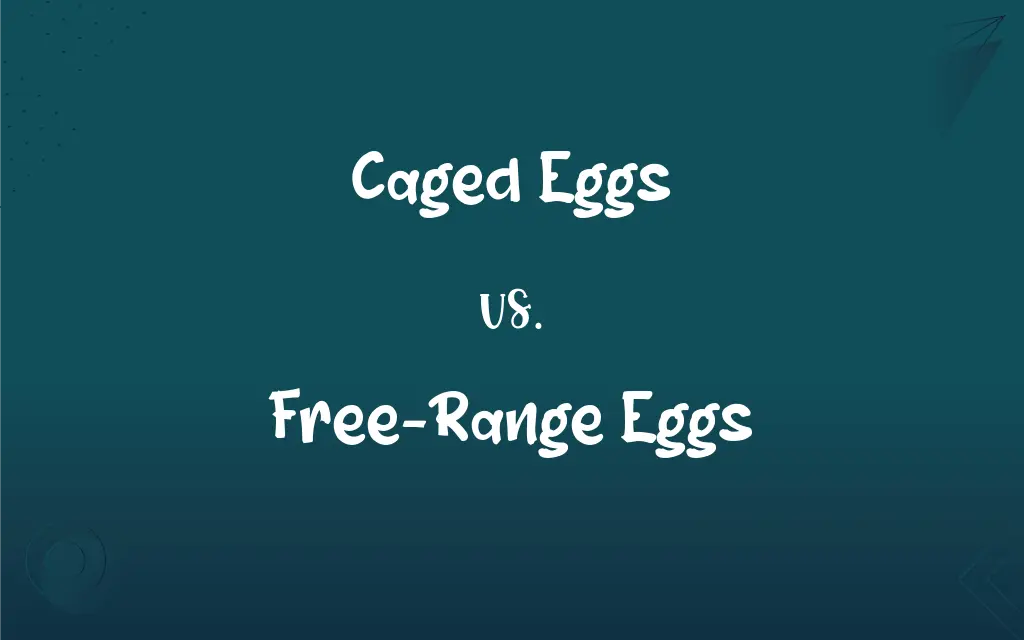Caged Eggs vs. Free-Range Eggs: What's the Difference?
Edited by Harlon Moss || By Janet White || Published on March 1, 2024
Caged eggs come from hens kept in confined spaces, while free-range eggs are from hens that can roam outdoors.

Key Differences
Caged eggs are produced by hens that live in small, confined cages, which restrict their movement and natural behaviors. These cages often house multiple birds and provide very limited space per hen, affecting their welfare. In contrast, free-range eggs are laid by hens that have some level of outdoor access, allowing them to exhibit natural behaviors such as foraging and dust bathing. This difference in housing conditions significantly impacts the quality of life of the hens.
Caged egg production is typically more cost-effective for farmers, as it allows for higher density of birds and easier management of feeding and waste removal. However, this system has been criticized for its ethical implications and potential for causing stress and physical harm to the hens. Free-range farming, while potentially more costly due to the need for more space and higher management requirements, is often viewed as more humane and sustainable.
The nutritional content of caged versus free-range eggs can vary. Some studies suggest that free-range eggs may have higher levels of certain nutrients, such as omega-3 fatty acids and vitamins, due to the hens' diet and outdoor activity. However, these differences can also be influenced by the hens' specific feed and the farm's management practices.
Consumers' choice between caged and free-range eggs often depends on concerns about animal welfare, environmental impact, nutritional benefits, and price. While caged eggs tend to be cheaper, the demand for free-range eggs has grown as awareness of animal welfare has increased, leading to changes in farming practices and regulations in many countries.
Regulatory definitions of "free-range" can vary, with some requiring specific amounts of outdoor access or environmental enrichments for the hens. In contrast, "caged" is more universally understood but still subject to variations in cage size and configuration. These regulatory differences highlight the importance of understanding label meanings when choosing eggs.
ADVERTISEMENT
Comparison Chart
Housing
Hens kept in cages with restricted movement.
Hens have outdoor access and more space.
Welfare
Generally lower welfare due to confinement.
Higher welfare due to natural behaviors.
Cost
Lower due to high-density farming.
Higher due to space and management needs.
Nutrition
Can be lower in some nutrients.
Potentially higher in omega-3s and vitamins.
Regulation
Defined by cage size and bird density.
Requires outdoor access, varies by region.
ADVERTISEMENT
Caged Eggs and Free-Range Eggs Definitions
Caged Eggs
Eggs produced by hens kept in enclosed cages with limited space.
The supermarket's caged eggs are cheaper but raise ethical concerns.
Free-Range Eggs
More expensive due to higher farming standards.
Despite their higher price, many choose free-range eggs for ethical reasons.
Caged Eggs
Associated with lower production costs.
Caged eggs provide a cost-effective option for consumers.
Free-Range Eggs
May offer nutritional benefits over conventional eggs.
Free-range eggs are often chosen for their superior nutritional profile.
Caged Eggs
Comes from birds living in high-density environments.
Caged eggs often result from prioritizing production efficiency over animal welfare.
Free-Range Eggs
Represents a more natural environment for hens.
The hens producing free-range eggs can exhibit natural behaviors.
Caged Eggs
Often criticized for ethical and welfare issues.
Animal rights activists campaign against the use of caged eggs due to welfare concerns.
Free-Range Eggs
Eggs from hens that have access to the outdoors.
Free-range eggs are praised for being more ethically produced.
Caged Eggs
Reflects conventional egg farming practices.
Despite the controversy, caged eggs dominate the global market.
Free-Range Eggs
Signifies higher welfare standards for hens.
Consumers prefer free-range eggs to support animal welfare.
FAQs
What are free-range eggs?
Eggs from hens that have access to outdoor space.
Can the nutritional content differ between caged and free-range eggs?
Yes, free-range eggs may have higher levels of certain nutrients.
What are caged eggs?
Eggs from hens kept in small, confined cages.
Why do some consumers prefer caged eggs?
Primarily due to lower cost.
Why are free-range eggs often more expensive?
Due to higher welfare and management costs.
What does "barn-raised" mean in comparison to caged and free-range?
Hens live in a barn without cage confinement but may not have outdoor access.
Is animal welfare the only reason to choose free-range over caged eggs?
No, considerations also include nutrition, taste, and environmental impact.
Are all free-range eggs organic?
No, "free-range" refers to access to outdoors, while "organic" involves feed and farming practices.
How do farming practices for caged and free-range eggs differ?
They differ in hen mobility, density, and access to natural behaviors.
Do regulations for caged and free-range eggs vary internationally?
Yes, standards and definitions can vary widely.
Do free-range hens live completely outdoors?
No, they have access to outdoors but also have indoor shelter.
Can egg labeling be misleading regarding welfare standards?
Yes, it's important to understand certification and standards.
Are there environmental benefits to choosing free-range eggs?
Potentially, due to more sustainable farming practices.
What are the ethical concerns with caged egg production?
Concerns include animal welfare and stress.
How do consumers impact egg farming practices?
Consumer demand influences farming standards and practices.
Is there a taste difference between caged and free-range eggs?
Some claim a taste difference, but it's subjective.
Can caged hens exhibit natural behaviors?
Very limited due to space constraints.
Do free-range eggs have a lower carbon footprint?
The impact varies based on farming practices.
How can consumers verify the authenticity of free-range eggs?
Look for certified labels and farm transparency.
Are there alternatives to caged and free-range eggs?
Yes, including pasture-raised and organic options.
About Author
Written by
Janet WhiteJanet White has been an esteemed writer and blogger for Difference Wiki. Holding a Master's degree in Science and Medical Journalism from the prestigious Boston University, she has consistently demonstrated her expertise and passion for her field. When she's not immersed in her work, Janet relishes her time exercising, delving into a good book, and cherishing moments with friends and family.
Edited by
Harlon MossHarlon is a seasoned quality moderator and accomplished content writer for Difference Wiki. An alumnus of the prestigious University of California, he earned his degree in Computer Science. Leveraging his academic background, Harlon brings a meticulous and informed perspective to his work, ensuring content accuracy and excellence.































































